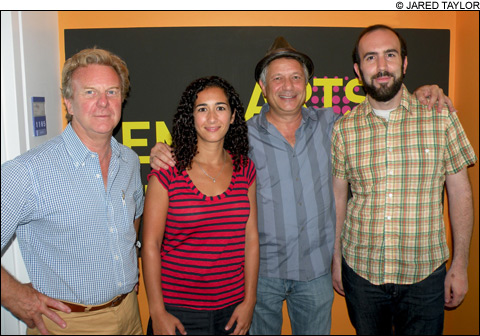
EYES AND EARS: To head up the ArtsEmerson initiative, trustees tapped former ART managing director Rob Orchard (far left). Orchard, in turn, recruited Dan Hirsch (far right), who had headed up the MFA’s musical program, and Rebecca Meyers (second from left), from the Harvard Film Archive, as collaborators. |
Connoisseurs and casual consumers this season will enjoy two debuts that will instantly redefine the depth and breadth of the Boston arts experience.
In November, the Museum of Fine Arts will open the doors to its vastly larger and substantially re-imagined building, nestled between the urban hum of Huntington Avenue and the more-laid-back-but-not-quite-bucolic meander of the Fens.
Closer to hand is next week’s inauguration of ArtsEmerson, a highly anticipated, three-tiered, multi-disciplinary performance series that will encompass theater, film, music, movement, and dance from around the world.
When the ArtsEmerson curtain rises at the handsomely restored Paramount Center on September 23, on stage will be Fraulein Maria, choreographer Doug Elkins’s deconstruction of Rodgers and Hammerstein’s The Sound of Music. The next night, at the Cutler Majestic Theatre, ArtsEmerson presents two groundbreaking works of postmodern social realism: The Laramie Project, the Tectonic Theater’s investigative drama examining the 1998 beating murder of a gay man, Matthew Shepard, near Laramie, Wyoming; and the world premiere of its sequel, The Laramie Project: Ten Years Later, exploring as facts fade to memory the psychic impact and aftermath of Shepard’s death.
At a glance, the MFA opening may appear to be the bigger deal. The hoopla surrounding it will be considerable. The architects of the project — MFA director Malcolm Rogers playing his corporate and political role and Pritzker Prize winner Norman Foster superintending the design — already enjoy substantial cultural celebrity in their respective spheres. The cumulative effect on the local psyche is likely to be the improbable equivalent of Harvard winning a Rose Bowl, something that has not occurred since 1920.
ArtsEmerson, on the other hand, will enjoy a vigorous but quieter welcome. Its long-term effect, however, may prove to be equally potent.
Creative leverage
ArtsEmerson is the spawn of a relatively small institution, Emerson College, that has been on the move for 20 years.
After abandoning what now clearly appears to have been an ill-conceived plan to move the performing-arts and communications school from its one-time Back Bay home to the old mill town of Lawrence, the school established a new beachhead at the corner of Tremont and Boylston streets and rechristened itself the “College on the Common.” Now, with the reopening of the Paramount, consolidating its hegemony in the theater district, where it already commands several major stages, Emerson becomes the largest single custodian of theatrical seats in Boston.
ArtsEmerson is, in part, about creatively leveraging those seats, engaging audiences made up of Boston residents and visitors from around the world with sufficient skill so as to equate the Emerson brand with compelling international performances.
Helming ArtsEmerson is Rob Orchard, veteran managing director of both the Yale Repertory Theater and Cambridge’s American Repertory Theater (ART). Emerson began its process of recruiting Orchard in June 2009, when trustee Ted Chandler read of Orchard’s retirement in the newspapers.
“Ted,” said Orchard, “is a marvelously philanthropic guy. God knows, I’ve picked his pockets enough over the years. So when he called and then followed up with a tour of the facilities I knew my goose was cooked. Goodbye unstructured time, hello ArtsEmerson.”